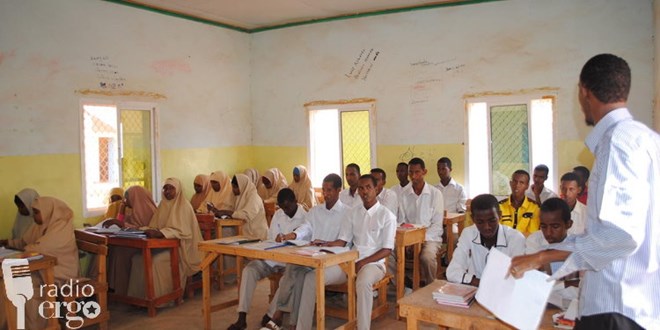
Tuesday August 31, 2021

High school students in Somalia during a class session/File Photo/Ergo
(ERGO) – Duran Abdullahi Hassan, 22, started at Hobyo’s first free high school on 15 August, four years after completing middle school in central Somalia’s Mudug region.
He was among 55 students from poor local families seizing a second chance at education with the opening of the district’s new high school.
“The school is an opportunity I didn’t have before,” said Duran, who has been working for a local fish trader since 2018, trying to support his elderly parents and younger sister.
“I go to school in the morning and work as a fisherman in the afternoon, although nowadays the sea is rough and there is not much fishing.”
Parents who can afford school fees send their children, mostly the boys, to high schools in cities such as Mogadishu, Galkayo and Adado. Duran’s parents could not afford a private school.
He has been earning $30 a week during good fishing seasons, although his family is now surviving on food taken on credit from local stores.
Fartun Salad Hashi also enrolled at the new high school. She had not expected to be able to continue studying after her parents decided not to send her away to school last year.
“As girls, it was difficult for our parents to send us to another town to further our education. That wasn’t possible because they feared for our safety and they also couldn’t afford the upkeep money,” she said.
Fartun, 21, said her sister Siham, 19, were both encouraged by their parents to enrol in the new school.
“I was so happy when I heard a high school was being established in our district. My hopes of advancing in my studies rose again,” she said.
Hobyo scholars, diaspora community and politicians established the school, which has six classrooms. The teachers are paid by the founders so that parents of poor children are not burdened by prohibitive fees.
The school principal, Muktar Abullaahi Mohamed, told Radio Ergo that it was important to find a solution to the problems facing children whose education is being cut short by lack of schools in the district.
“Some of the children started using drugs since they had nothing else to occupy themselves,” he said.
Muktar said he and his staff are raising awareness among students who have been out of school for a long time and lobbying their parents to take advantage of the free high school.
They plan to expand the school to cater for students in Hobyo and the surrounding villages. Muktar said the construction and equipping of the school cost $36,900, which was donated by the volunteers who established the school.